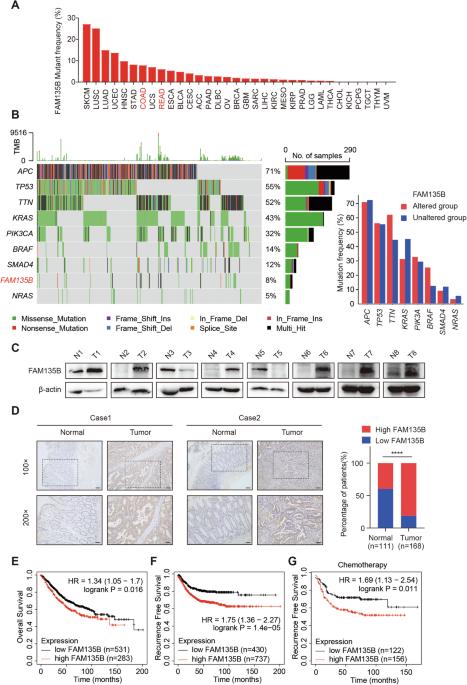Aberrant FAM135B attenuates the efficacy of chemotherapy in colorectal cancer by modulating SRSF1-mediated alternative splicing
IF 6.9
1区 医学
Q1 BIOCHEMISTRY & MOLECULAR BIOLOGY
引用次数: 0
Abstract
Oxaliplatin is the frontline chemotherapy drug for the treatment of colorectal cancer (CRC) and its insensitivity is a major limitation on therapeutic efficacy. Genomic instability is the prominent feature of CRC and is considered to correlate with response to treatments. However, the underlying mechanism of insensitivity to oxaliplatin (L-OHP) remains largely unclear. Herein, sequence similarity 135 family member B (FAM135B) is identified as a frequently mutated gene in CRC and is critical for CRC proliferation and impaired response to L-OHP by controlling SRSF1-mediated alternative splicing. Specifically, FAM135B promotes the nuclear translocation of SRSF1 by synergistically binding with SRPK1 and regulates SRSF1-mediated splicing of DNA repair genes. FAM135B-induced exon IV inclusion of FAAP20 mediates its binding with FACNA and enhances the functional integrity of the FA core complex, thereby activating the FA pathway and resulting in inter-strand crosslink (ICL) lesion repair and L-OHP insensitivity. These findings reveal that the FAM135B-SRSF1 axis-mediated splicing contributes to DNA repair and chemotherapeutic insensitivity in CRC. Targeting FAM135B represents a potential strategy for CRC treatment.

异常的 FAM135B 通过调节 SRSF1 介导的替代剪接来削弱结直肠癌化疗的疗效。
奥沙利铂是治疗结直肠癌(CRC)的一线化疗药物,其不敏感性是制约疗效的主要因素。基因组不稳定性是 CRC 的显著特征,并被认为与治疗反应相关。然而,对奥沙利铂(L-OHP)不敏感的潜在机制在很大程度上仍不清楚。在本文中,序列相似性135家族成员B(FAM135B)被确定为CRC中一个频繁突变的基因,它通过控制SRSF1介导的替代剪接,对CRC的增殖和对L-OHP的反应受损至关重要。具体来说,FAM135B 通过与 SRPK1 协同结合促进 SRSF1 的核转位,并调节 SRSF1 介导的 DNA 修复基因的剪接。FAM135B 诱导的 FAAP20 第 IV 号外显子包含介导其与 FACNA 的结合,并增强 FA 核心复合物的功能完整性,从而激活 FA 通路,导致链间交联(ICL)损伤修复和 L-OHP 不敏感。这些发现揭示了FAM135B-SRSF1轴介导的剪接有助于DNA修复和化疗对CRC不敏感。靶向 FAM135B 是治疗 CRC 的一种潜在策略。
本文章由计算机程序翻译,如有差异,请以英文原文为准。
求助全文
约1分钟内获得全文
求助全文
来源期刊

Oncogene
医学-生化与分子生物学
CiteScore
15.30
自引率
1.20%
发文量
404
审稿时长
1 months
期刊介绍:
Oncogene is dedicated to advancing our understanding of cancer processes through the publication of exceptional research. The journal seeks to disseminate work that challenges conventional theories and contributes to establishing new paradigms in the etio-pathogenesis, diagnosis, treatment, or prevention of cancers. Emphasis is placed on research shedding light on processes driving metastatic spread and providing crucial insights into cancer biology beyond existing knowledge.
Areas covered include the cellular and molecular biology of cancer, resistance to cancer therapies, and the development of improved approaches to enhance survival. Oncogene spans the spectrum of cancer biology, from fundamental and theoretical work to translational, applied, and clinical research, including early and late Phase clinical trials, particularly those with biologic and translational endpoints.
 求助内容:
求助内容: 应助结果提醒方式:
应助结果提醒方式:


